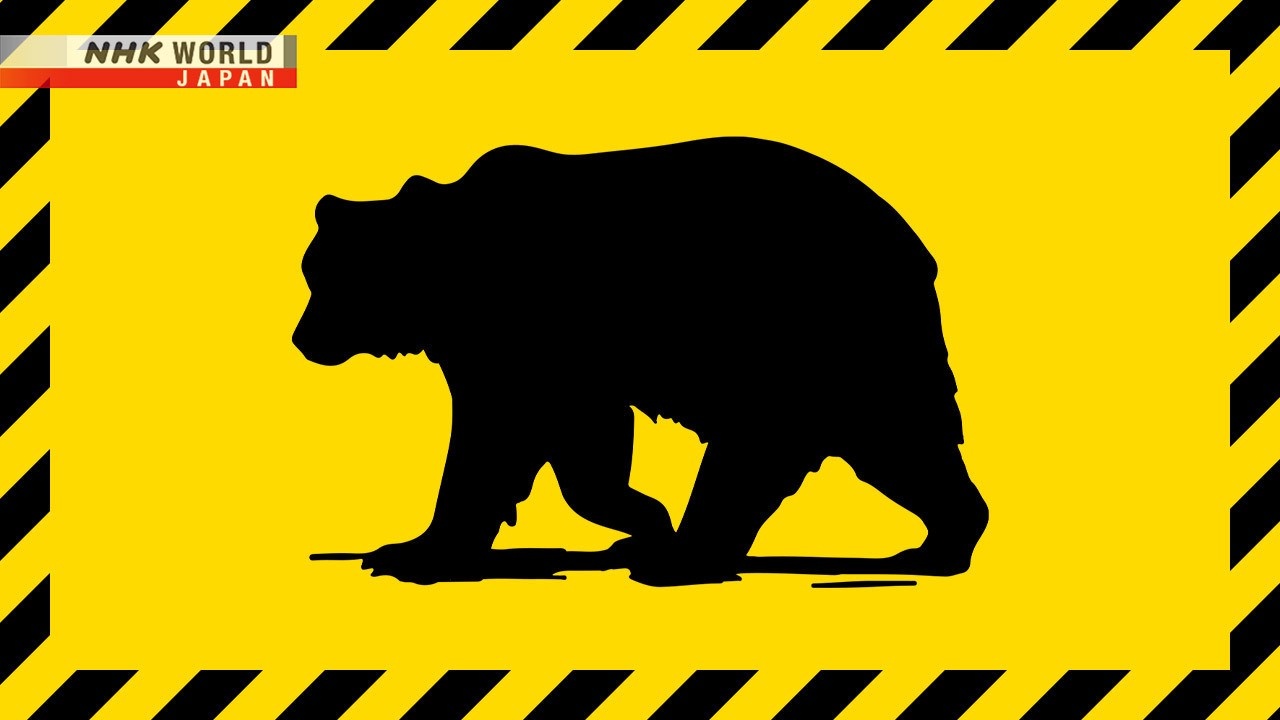"Bear Attacks in Japan on the Rise"
Welcome to "Learn Japanese from the News." In this program we learn Japanese and more about Japan from news stories presented in simple Japanese. Today's headline is "Bear Attacks in Japan on the Rise" which was published on NEWS WEB EASY's website on October 6, 2023. Keywords include 「熊(くま)kuma」"bear" and 「襲う(おそう)osou」"attack."

"Bear Attacks in Japan on the Rise"
♪
Welcome to "Learn Japanese from the News."
Join us as we learn Japanese and about the country through Japanese news stories. Today's headline is…
♪
熊(くま)が襲(おそ)ってきてけがをする人(ひと)が増(ふ)えている
"Bear Attacks in Japan on the Rise"
This news story was published on NEWS WEB EASY's website on October 6th.
Now let's go over some vocab words that will help us understand what's going on.
熊(くま)
bear
襲(おそ)う
attack
どんぐり
acorn
acorns are a major food source for bears in Japan.
Now let's keep these words in mind as we listen.
「秋田県(あきたけん)では10月(がつ)4日(よっか)までに、熊(くま)が襲(おそ)ってきて30人(にん)がけがをしました。今(いま)まででいちばん多(おお)くなっています。北海道(ほっかいどう)や東北(とうほく)、北陸(ほくりく)などでは、警報(けいほう)や注意報(ちゅういほう)を出(だ)して熊(くま)に気(き)をつけるように言(い)っています。
熊(くま)の専門家(せんもんか)は「熊(くま)が食(た)べるどんぐりが、今年(ことし)はとても少(すく)なくて、人(ひと)が生活(せいかつ)している所(ところ)まで、食(た)べ物(もの)を探(さが)しに来(き)ています」と言(い)っています。
専門家(せんもんか)は、「熊(くま)が近(ちか)くに来(こ)ないようにするスプレーや、鈴(すず)など音(おと)が鳴(な)るものを持(も)ったほうがいい」と言(い)っています。また、「山(やま)には1人(ひとり)で入(はい)らないほうがいいです。人(ひと)が話(はな)す声(こえ)が熊(くま)に聞(き)こえると、熊(くま)が近(ちか)くに来(こ)なくなります。そして、もし事故(じこ)があった場合(ばあい)に連絡(れんらく)ができます」と言(い)っています。」
Reports of bear attacks have been increasing across Japan, and officials in regions such as Hokkaido, Tohoku, and Hokuriku have been issuing bear alerts and safety warnings.
It's thought that a poor harvest of acorns this year is causing the animals to wander into human settlements to forage for food before they go into hibernation for the winter. That's led to a sharp rise in bear-related incidents.
♪
Now we'll break down a few sentences from the story that contain helpful expressions and keywords.
Let's start with the following sentence:
北海道(ほっかいどう)や東北(とうほく)、北陸(ほくりく)などでは、警報(けいほう)や注意報(ちゅういほう)を出(だ)して熊(くま)に気(き)をつけるように言(い)っています。
"In the Hokkaido, Tohoku, and Hokuriku regions, warnings and advisories have been issued, and people are being urged to be on the lookout for bears."
Both 警報(けいほう)and 注意報(ちゅういほう)are intended to inform people that they are in danger and to urge them to take action to protect themselves. You'll often hear the terms used in news about the weather.
In the case of bear-related incidents, announcements are issued by local governments. There are differences depending on the region, but in general a 注意報(ちゅういほう)is an advisory that serves to notify the public that sightings are on the rise and they should watch out for their safety. In contrast, a 警報(けいほう)is a warning or alert that is issued when a fatal bear attack occurs or when the number of recent sightings is particularly high.
So a 警報(けいほう)is more serious than a 注意報(ちゅういほう), and when one is issued, you should be on high alert.
OK, let's move on to our next sentence. This is a quote from a bear expert.
山(やま)には1人(ひとり)で入(はい)らないほうがいいです。
"It is better not to go into the mountains alone."
The phrase ほうがいい is used to say that a certain course of action is recommended.
It's a way to give advice or suggest to someone that they should do something.
In the sentence 山(やま)には1人(ひとり)で入(はい)らないほうがいいです, the course of action that is being suggested is 入(はい)らない, that is, "to not enter."
The story includes another piece of advice from the expert: 鈴(すず)など音(おと)が鳴(な)るものを持(も)ったほうがいい, which means "It's a good idea to have something that makes a noise, such as a bell."
Alright, and that's all for today.
This year municipalities across Japan have issued not just bear 注意報(ちゅういほう) but bear 警報(けいほう).
Yes, and many incidents have been reported in populated residential and urban areas. The situation is likely to continue until bears enter hibernation around December.
Yes, so everybody should remain on the lookout for the bears.
OK. Be sure to tune in next time for more!
♪